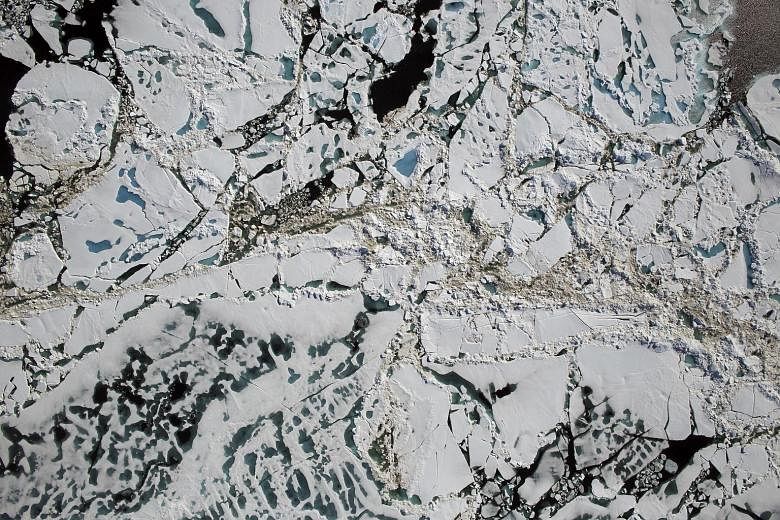NEW YORK • A period of extreme warmth in the Arctic over the past two months has startled scientists, who warn that the high temperatures may lead to record-low ice coverage next summer and even more warming in a region that is already among the hardest hit by climate change.
In mid-November, parts of the Arctic were more than 19.4 deg C higher than observed averages, scientists said, and at the pole itself, mean temperatures for the month were 12.8 deg C above normal. Although conditions later cooled somewhat, the extreme warmth is expected to return, with temperatures forecast to be as much as 15 deg C above normal beginning yesterday.
Dr Jeremy Mathis, who directs the Arctic Research Programme for the National Oceanic and Atmospheric Administration (NOAA), said the warmth had led to a later-than-usual "freeze-up" of ice in the Arctic Ocean. That in turn may lead to record-low ice coverage in the spring and summer, which could lead to more warming because there will be less ice to reflect the sun's rays and more darker, exposed ocean to absorb them.
"We're going to be watching the summer of 2017 very closely," Dr Mathis said in an interview.
On Wednesday, researchers released a study linking the abnormally high Arctic temperatures to climate change caused by humans. Using simulations of the climate, both current and before widespread carbon emissions, they found that the likelihood of extreme temperatures like those that occurred this autumn had increased from about once every 1,000 years to about once every 50 years .
"A warm episode like the one we are currently observing is still a rare event in today's climate," said one of the researchers, Dr Friederike Otto, a senior scientist at the Environmental Change Institute at the University of Oxford in Britain. "But it would have been an extremely unlikely event without anthropogenic climate change."
What's more, Dr Otto said, if climate change continues at its current pace, periods of extreme Arctic warmth may become common, in the order of once every two years. "It's one region where we see the impacts of climate change very strongly," she said.
Dr Walt Meier, a research scientist at Nasa's Goddard Space Flight Centre, said that the current warmth had been brought on by fluctuations in the jet stream, which have allowed frigid air to make its way south into North America and warm air into parts of the Arctic.
While such outbreaks of extreme warmth are not new, he said, there are many signs that climate change is making them more frequent. "We're loading the dice to make this more likely," he said.
While the earth overall has been warming - a record for warmth was set last year, and it is expected to exceed it - the Arctic has been warming at least twice as fast as the global average.
Scientists say that is partly because of declines in sea ice coverage. Ice typically reflects between about half and 70 per cent of the solar energy that hits it, but water reflects only 6 per cent, and this warms the water up. That melts more ice, which in turn leads to more exposed ocean and more melting - what is known as a positive feedback loop.
The recent high temperatures have had a severe impact on Arctic sea-ice formation.
Ice coverage is the lowest for any November since satellite records began in 1979, NOAA said. Sea ice is also getting thinner on average, as thicker, multi-year ice melts and is replaced by ice that lasts only a year.
At a news conference, Dr Mathis said that in addition to the extreme warm periods, the overall year was the warmest on record.
NYTIMES

